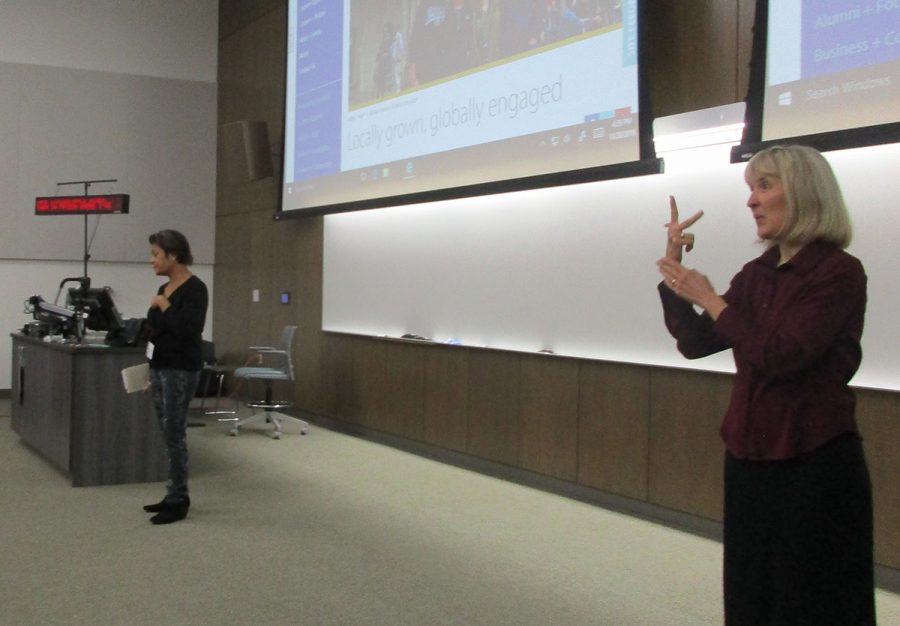Author addresses labels as invisible disability
Born in prison, author uses experience to raise hope and awareness of labels
More stories from Lara Bockenstedt
Photo by Lara Bockenstedt
Author of “Prison Baby: A Memoir” stands beside a sign language interpreter. Jiang-Stein spoke about labels as an invisible disability and stereotypes carried against incarcerated women.
Born in prison, an author and activist spent her first year of life often in solitary confinement with her mother, a heroin addict.
Decades later, Deborah Jiang-Stein is using that experience as a catalyst to raise awareness about labels as an invisible disability for those fresh out of incarceration. Jiang-Stein discussed her experiences, also printed in her book, “Prison Baby: A Memoir,” Thursday at UW-Eau Claire’s Schneider Disability Issues Forum in Centennial Hall.
“I knew I was struggling with something emotionally,” Jiang-Stein said of her infancy in prison, which led to a mute childhood and a delinquent adolescence. “Behind that muteness was fear.”
As the final event for the Chippewa Valley Book Festival, it was also a Forum Series event and part of the class ES 385: social foundations of human relations. The forum took place during national Invisible Disabilities Week.
Jiang-Stein’s invisible disability took form in a label — “prison baby” — which led to others such as “special needs” and “at-risk.”
While Jiang-Stein presented at the front of a lecture hall, a sign language interpreter stood to her left, and captioning followed the speech on a screen to her right. Each seat in the hall’s largest lecture room was filled with students sitting in aisles to listen.
One of the first times she spoke at a prison, she said, an inmate asked her if she remembered anything from the year she was with her mother in prison.
She said she could recall watching her mother walk with a wheelbarrow, although she didn’t know the significance of this memory. The inmates, she said, immediately turned to look out a window where a wheelbarrow sat in the yard.
They said her mother would have put belongings in it as she headed on her way to solitary confinement. Jiang-Stein later discovered she had been put in solitary confinement as an infant with her mother. She believes it is why to this day she becomes overstimulated by too much color, sound and movement.
Throughout the first 20 years of her life, Jiang-Stein said although she is at peace with them, her parents didn’t understand her behavior. Other figures such as teachers and neighbors better understood how to socially navigate her history, she said.
Beyond the disability of labels, Jiang-Stein raised awareness of the stereotypes held against women in prison. Over the past 20 years, the amount of women in prison grew by 800 percent, Jiang-Stein said, compared to 350 percent for men.
She said women’s experiences differ from men because they are separated from their families and experience shame upon release.
Conrad Felton, a senior communication sciences and disorders student, was a member of the class attending the forum. He said the event was informative, seeing as it was a topic of which he was previously unaware.
“I have a relative in jail,” he said. “It makes me think about her situation, knowing (Jiang-Stein’s) background, and think about how I’m going to bring it into discussion with my family.”
Jiang-Stein said it’s important to begin conversations about incarceration in the U.S., and how we’re putting the wounded there.
“You know, we’re a culture that likes everything pretty,” she said. “We don’t want to talk about what’s difficult.”
Another attendant, Marjorie Bunce, a resident of Altoona, Wisconsin said she thought the presentation touched on many conceptions of disability. There are many emotions that are tough to talk about, she said.
Bunce has six grandchildren. Two of these grandchildren live with clinically diagnosed disabilities. She said the presentation made her think differently about being disabled, that there are many ways to be disabled.
Following the speech, Jiang-Stein gave responses during a question and answer portion. She later signed books and talked with individual audience members.
To learn more about Jiang-Stein and her life experiences, visit www.deborahstein.com.


